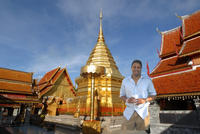Curious about Stereotypes: How Harmful Are They?
The other day, at the end of another fitness instructor’s class, I heard her welcome a new participant. He was an older man with blue eyes, a fair complexion and a heavy accent. This instructor is caring and always encouraging - especially of the newer students.
She asked him where he was from, and when he answered, “Pakistan,” I was shocked to hear her answer, “That’s a surprise! I thought everyone from there would have black hair and dark brown eyes.” At least, she did not go so far with her stereotyping to also say, “Dark skin.”
This started me thinking about how often we all deal with thinking and believing in stereotypes and how harmful this can be.
Let me begin by giving some definitions:
- A conventional, formulaic, and oversimplified conception, opinion, or image.
- One that is regarded as embodying or conforming to a set image or type.
- To characterize by a stereotype: “Elderly Americans are the neglected sector of the fashion industry, stereotyped by blue hair and polyester pantsuits” (American Demographics).
I submit to you that we all do this - whether consciously or unconsciously - and it can be terribly harmful. For example, the teacher stereotype has been around for a long time (I even read this same statement in a current e-newsletter):
Writing in the Profession of Teaching in 1901, a Boston educator, James P. Monroe, wrote, “The aphorism attributed to George Bernard Shaw, `He who can, does; he who cannot, teaches,’ appears to have wide credence among intellectuals and educated groups. Primary and secondary teaching are often seen as a refuge for mediocre people who are industrious but unimaginative and uncreative.”
Just reading the above reminded me of how so many of us believed this, both when I was in college for the first time in the 50s and then when I returned to study art in the 70s.
Being involved in the fitness industry - I teach eleven to twelve classes a week - I realized when I started to write this blog, how in the past I tended to stereotype those people I see with huge, obese bodies. Why didn’t they have enough discipline to eat less and exercise more? I work at this constantly myself.
Recently, however, I listened to some tapes of Oprah Winfrey describing her battle with overweight. I heard her pain and could really relate. Even though she was so successful as a TV personality, she didn’t even want to accept an award because she was so ashamed of her overweight body. By hiring a trainer, she has embraced control. But not many people have the means or the incentive to accomplish what she has. Now, at least, I have stopped stereotyping others for their large bodies and am doing all I can to help and encourage them.
It is also a tendency to stereotype our children and other family members. Oh yes, “Chris has a mind for numbers, but lacks a sense of rhythm,” came out of my mother’s mouth every time she told people she was sending me to ballet classes and piano lessons. This made teaching aerobics even more difficult than I had ever imagined - until, that is, I discovered that many struggle with keeping time with the music.
Ashley Olsen addressed this, “Lizzie plays club volleyball and Trent is an amazing writer. We're lucky our parents didn't stereotype us, so we could figure out who we are for ourselves.”
So, I am asking you how you stereotype. And, is it harmful (usually is)?
I challenge you to work at overcoming the stereotypes that you believe in, and do send me your comments.


